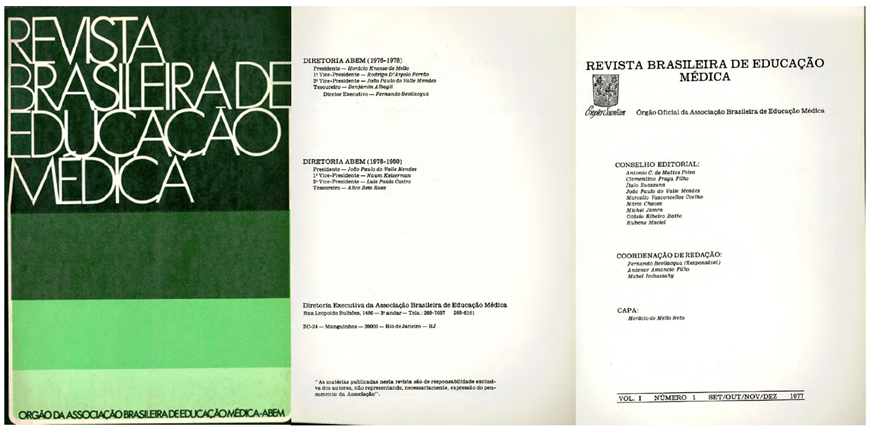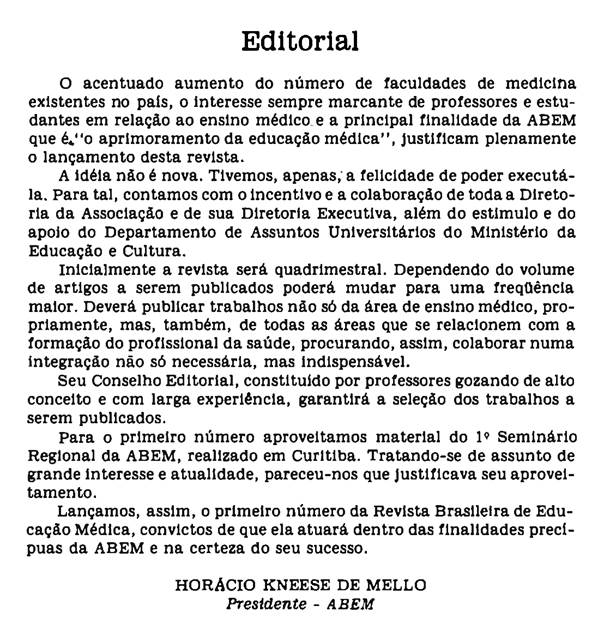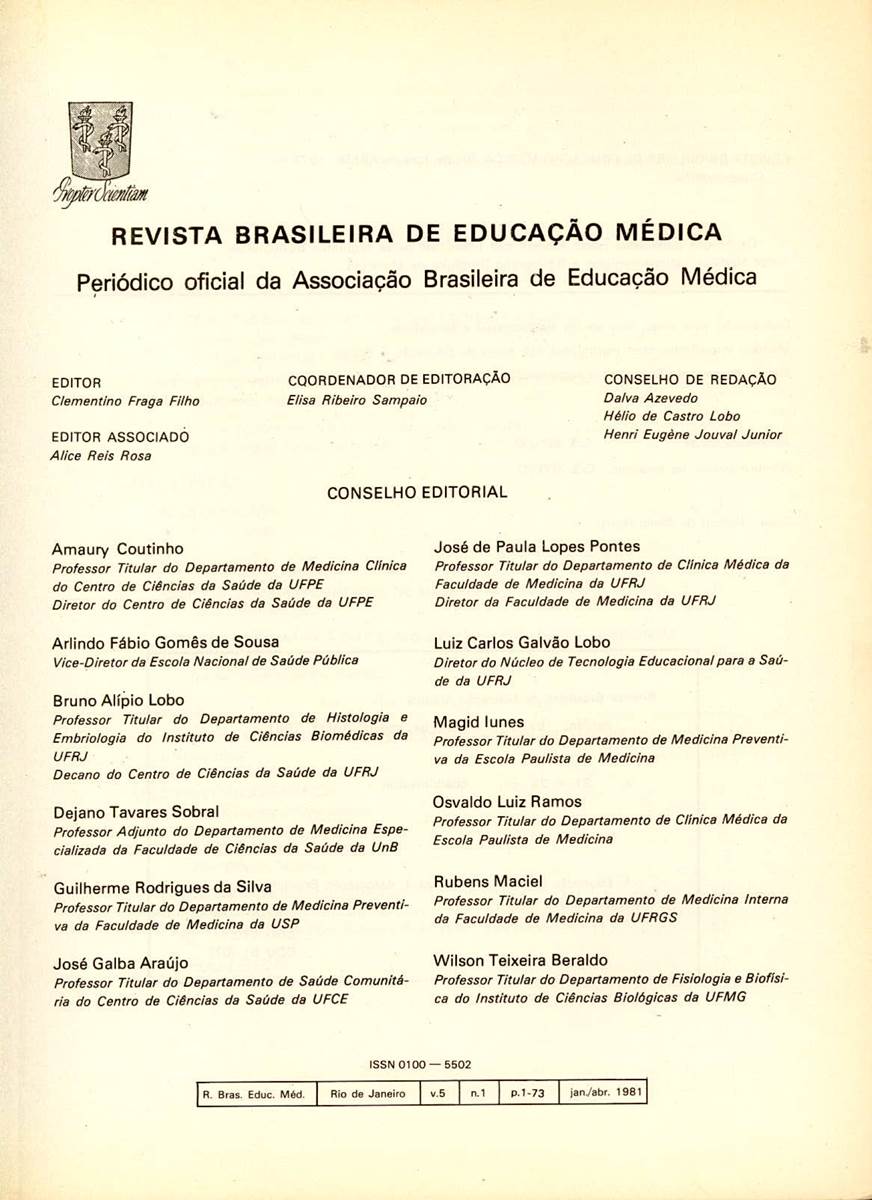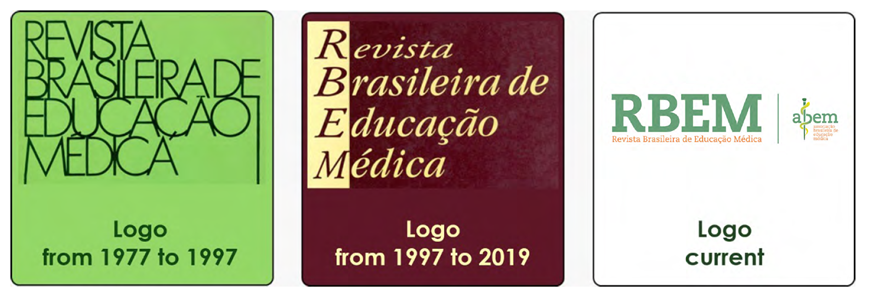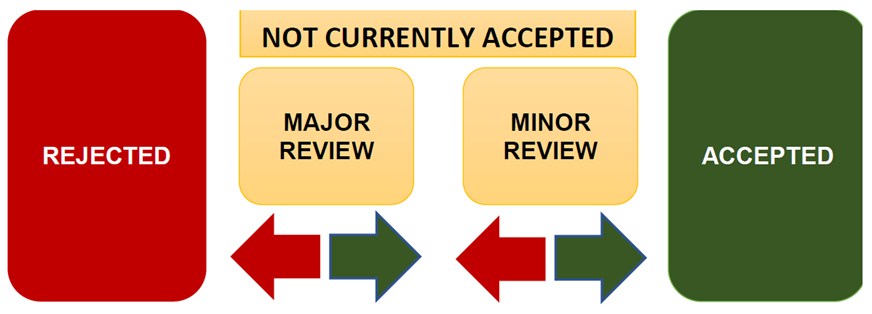Services on Demand
Journal
Article
Share
Revista Brasileira de Educação Médica
Print version ISSN 0100-5502On-line version ISSN 1981-5271
Rev. Bras. Educ. Med. vol.46 no.4 Rio de Janeiro 2022 Epub Nov 25, 2022
https://doi.org/10.1590/1981-5271v46.4-editorial
EDITORIAL
Revista Brasileira de Educação Médica: 45 years of history
1Associação Brasileira de Educação Médica, Brasília, Distrito Federal, Brazil.
2Universidade Federal do Rio Grande do Norte, Natal, Rio Grande do Norte, Brazil.
3União Pioneira de Integração Social, Brasília, Distrito Federal, Brazil.
4Universidade do Estado do Rio de Janeiro, Rio de Janeiro, Rio de Janeiro, Brazil.
FIRST EDITION
The Brazilian Journal of Medical Education (RBEM, Revista Brasileira de Educação Médica) is the scientific dissemination organ of the Brazilian Association of Medical Education (ABEM, Associação Brasileira de Educação Médica)1),(2. Its first publication was in 1977 (Figure 1) and two Boards of Directors of ABEM were responsible for its dissemination, the Editorial Board and the Writing Coordinators, as shown in Table 1:
Table 1 Teams responsible for publishing the first edition of the Brazilian Journal of Medical Education (RBEM).
| Board of Directors of the Brazilian Association of Medical Education (ABEM) | ||
|---|---|---|
| Positions | 1976-1978 | 1978-1980 |
| President: | Horácio Kneese de Melo | João Paulo do Vale Mendes |
| 1st Vice-President: | Rodrigo D’Argolo Ferrão | Naum Kelserman |
| 2nd Vice-President: | João Paulo do Vale Mendes | Luiz Paula Castro |
| Treasurer: | Benjamin Albagli | Alice Reis Rosa |
| Chief Executive Officer (CEO): | Fernando Bevilacqua | |
| Editorial Board | ||
| Antonio C. de Mattos Paiva | ||
| Clementino Fraga Filho | ||
| Ítalo Suassuna | ||
| João Paulo do Valle Mendes | ||
| Marcello Vasconcellos Coelho | ||
| Mário Chaves, Michel Jamra | ||
| Otávio Ribeiro Ratto | ||
| Rubens Maciel | ||
| Editorial coordination | ||
| Fernando Bevilacqua | ||
| Antenor Amancio Filho | ||
| Mabel Imbassahy | ||
Source: The authors.
According to the editorial by Horácio Kneese de Melo, President of the Editorial Board of ABEM from 1976 to 1978, published in Issue 1.1 of the journal, the reason for launching RBEM was:
“the marked increase in the number of medical schools in the country, the ever-increasing interest by teachers and students regarding medical education and the main purpose of ABEM, which is “the improvement of medical education”3.
Volume 1 of RBEM contained only 1 issue and in this edition, material from the 1st ABEM Regional Seminar, held in Curitiba, was published.
As stated in the book “Medical education and the political arena: the 60 years of ABEM”4, it was at the 1977 COBEM, held in November in the city of Belém (state of Pará), that the first issue of the Brazilian Journal of Medical Education (RBEM) was presented, with a proposal of three annual issues, which had as a guiding reflection the relationship between medical education and assistance services considering scientific and technological advances in health, divided into three panels: “The teaching of basic disciplines in the health area in the face of Universitary Reform”; “The teaching of clinical medicine” and “The reality of enrollment by discipline in medical schools”4.
VOLUMES AND ISSUES
The initial volumes of RBEM were quarterly; at some time, it was published annually, but returned to being quarterly and from 2008 onwards it became quarterly, the currently adopted format. Moreover, special editions and supplements focused on topics crucial to medical education have been published. It is also worth noting that some issues were not published (Table 2).
Table 2 Summary of RBEM volumes and issues
| YEAR | VOLUME | ISSUES | SUPPLEMENTS | ||||
|---|---|---|---|---|---|---|---|
| 1977 | 1 | 1 | - | - | - | ||
| 1978 | 2 | 1 | 2 | 3 | - | Supplement 1 | - |
| 1979 | 3 | 1 | 2 | 3 | - | - | - |
| 1980 | 4 | 1 | 2 | 3 | - | - | - |
| 1981 | 5 | 1 | 2 | 3 | - | - | - |
| 1982 | 6 | 1 | 2 | 3 | - | - | - |
| 1983 | 7 | 1 | 2 | 3 | - | - | - |
| 1984 | 8 | * | 2 | * | - | - | - |
| 1985 | 9 | 1 | 2 | 3 | - | - | - |
| 1986 | 10 | - | 2 | 3 | - | - | - |
| 1987 | 11 | 1 | 2 | 3 | - | - | - |
| 1988 | 12 | 1 | 2 | - | - | - | - |
| 1989 | 13 | 1 | - | - | - | ||
| 1990 | 14 | 1 | - | - | - | ||
| 1991 | 15 | 1 | - | - | - | ||
| 1992 | 16 | 1 | - | - | - | ||
| 1993 | 17 | 1 | 2 | 3 | - | - | - |
| 1994 | 18 | 1 | 2 | 3 | - | - | - |
| 1995 | 19 | 1 | - | - | - | ||
| 1996 | 20 | 1 | 2/3 | - | Special edition | - | |
| 1997 | 21 | 1 | 2/3 | - | - | - | |
| 1998 | 22 | 1 | 2/3 | - | Supplement 1 | - | |
| 1999 | 23 | 1 | 2/3 | - | - | - | |
| 2000 | 24 | 1 | 2 | 3 | - | - | - |
| 2001 | 25 | 1 | 2 | 3 | - | - | - |
| 2002 | 26 | 1 | 2 | 3 | - | Supplement 1 | Supplement 2 |
| 2003 | 27 | 1 | 2 | 3 | - | - | - |
| 2004 | 28 | 1 | 2 | 3 | - | - | - |
| 2005 | 29 | 1 | 2 | 3 | - | - | - |
| 2006 | 30 | 1 | 2 | 3 | - | - | - |
| 2007 | 31 | 1 | 2 | 3 | - | - | - |
| 2008 | 32 | 1 | 2 | 3 | 4 | - | - |
| 2009 | 33 | 1 | 2 | 3 | 4 | Supplement 1 | - |
| 2010 | 34 | 1 | 2 | 3 | 4 | - | - |
| 2011 | 35 | 1 | 2 | 3 | 4 | - | - |
| 2012 | 36 | - | 2 | 3 | 4 | Supplement 1 | Supplement 2 |
| 2013 | 37 | 1 | 2 | 3 | 4 | - | - |
| 2014 | 38 | 1 | 2 | 3 | 4 | - | - |
| 2015 | 39 | 1 | 2 | 3 | 4 | - | - |
| 2016 | 40 | 1 | 2 | 3 | 4 | - | - |
| 2017 | 41 | 1 | 2 | 3 | 4 | - | - |
| 2018 | 42 | 1 | 2 | 3 | 4 | - | - |
| 2019 | 43 | 1 | 2 | 3 | 4 | Supplement 1 | - |
| 2020 | 44 | 1 | 2 | 3 | 4 | Supplement 1 | - |
| 2021 | 45 | 1 | 2 | 3 | 4 | Supplement 1 | |
| 2022 | 46 | 1 | 2 | 3 | 4 | ||
*Unpublished issues.
Source: ABEM collection
Until 2013, the journal was published in printed format, becoming available only in electronic format as of 2014, currently adopting the continuous flow publication system. In 2007, it was added to the Scientific Electronic Library Online (SciELO) collection, where its articles are currently published. (https://www.scielo.br/j/rbem/grid). RBEM is also indexed in the following databases: Virtual Library of Education in Health Sciences - EDUCA (Biblioteca Virtual de Educação em Ciências da Saúde); Summaries of Brazilian Journals - SUMARIOS; Latin American and Caribbean Literature in Health Sciences - LILACS (Literatura Latino-Americana e do Caribe em Ciências da Saúde); Index of Latin American Science Journals - PERIODICA (Índice de Revistas Latinoamericanas de Ciencias); Database on Education - IRESIE (Base de datos sobre Educación); Directory of Open Access Journals - DOAJ and Online Regional Information System for Scientific Journals of Latin America, the Caribbean, Spain and Portugal - LATINDEX (Sistema Regional de Información en Línea para Revistas Científicas de América Latina, el Caribe, España y Portugal). In 2022, RBEM submitted the process for the indexing in the Scopus database (Elsevier).
EDITORS
The first editions of the journal did not mention a name at the position of Editor, and only in 1981, in edition 5.1, was the figure of the Editor represented by Clementino Fraga Filho (Figure 3). After that, all editions had editors related to the creation of the material to be published (Table 3).
Table 3 RBEM Editors
| YEAR OF INAUGURATION | EDITORS |
|---|---|
| 1981 | Clementino Fraga Filho |
| 1983 | Fernando Figueira |
| 1985 | Alice Reis Rosa |
| 1986 | Celia Lucia Monteiro de Castro |
| 1987 | Heloisa Maria Mendonça de Morais |
| 1988 | Frederico Simões Barbosa |
| 1993 | William Saad Hossne |
| 1997 | Jadete Barbosa Lampert |
| 1998 | Sérgio Tavares de Almeida Rêgo |
| 2015 | Lilian Koifman |
| 2016 | Olavo Franco Ferreira Filho |
| 2019 | Daniela Chiesa |
| 2020 | Rosiane Viana Zuza Diniz |
Source: ABEM collection.
The Editor in Chief receives the manuscripts that meet the regulations for publication in the journal, assigning to the associate editors (AE) the manuscripts that are within the scope of RBEM and have an innovative characteristic for the follow-up of the editorial process. These are in charge of conducting the process, from the choosing of reviewers to announcing the final decision regarding each manuscript.
LOGO
The first RBEM logo consisted of all the letters of its name and the background color of the cover was changed in each volume. In 1997, the layout of the letters was changed, but the color continued to be modified for each edition. At the end of 2019, the journal’s logo was changed, and started to feature the ABEM logo together with its name. The RBEM logos can be seen in Figure 4.
EDITORIAL PROCESS
Using a double-blind, peer-review process, the journal increased its editorial staff in 2021, based on a public invitation process for interested parties, with associate editors representing, for the first time, all ABEM regional offices. Moreover, it incorporated international associate editors to the team and also started to disclose in the published article the team of editors responsible for the editorial process.
The journal’s editorial process is a complex one and has been improved, especially over the last five years, aiming to speeding up and improving the quality of decisions. In this context, RBEM as a member of the Brazilian Association of Scientific Editors (ABEC Brasil - Associação Brasileira de Editores Científicos) has publicized and encouraged the participation of members of the editorial board in updating activities related to the necessary competences for reviewers and associate editors and the journal’s administrative team. Topics such as ethics and scientific integrity, open science and how to review scientific articles have been crucial in the last two years5.
There are four possible final decisions arising from the peer review, as shown in Figure 5. Manuscripts with major and minor revision decision are adjusted by the authors and submitted to a new peer-review process, which may result in rejection or acceptance of the manuscript.
Throughout its 45 years of existence, RBEM has shown significant growth, considering the number of article submissions and publications, especially observed during the period of the COVID-19 pandemic. Moreover, preserving the different topics of the journal’s scope, a variety of relevant topics published on the perspectives of medical education has been observed. It is noteworthy the presence of the central topic of COVID-19 among the publication topics in 2022, showing the importance of the journal for the scientific dissemination of emerging topics (figure 6).

Source: Brazilian Journal of Medical Education. Available at: https://reports04.manuscriptcentral.com/cognos10/cgi-bin/cognos.cgi
Figure 6 Topics of publications and number of submissions to the Brazilian Journal of Medical Education - RBEM in the last seven years.
Although submissions by national authors predominate, RBEM has received manuscripts from many continents, such as America (North America: 9 and South America: 1,529), Europe (9), Africa (6) and Asia (1). The distribution of publications according to the authors’ country of origin can be seen in Figure 7.
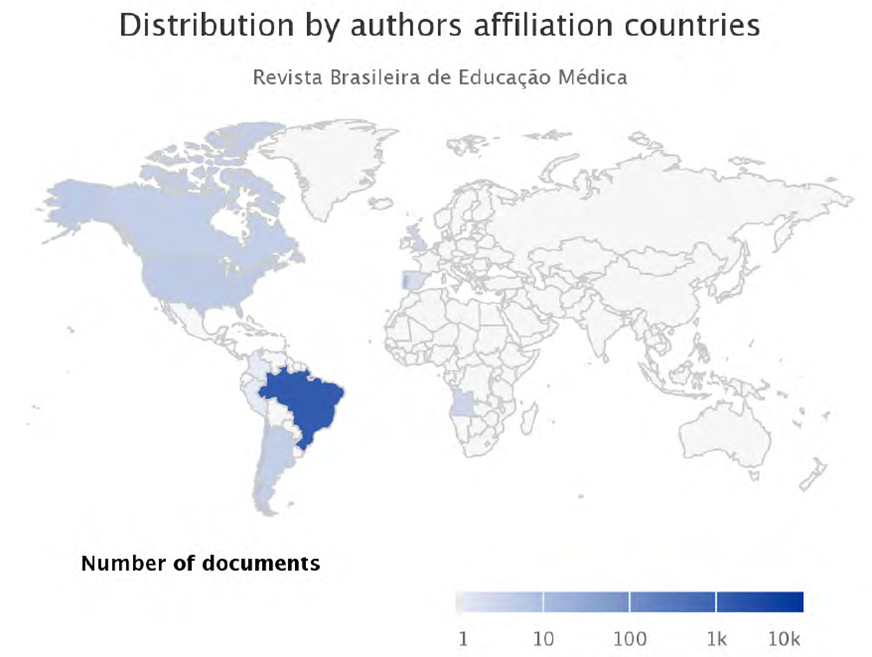
Source: Scielo2. Available at: https://analytics.scielo.org/?journal=0100-5502&collection=scl.
Figure 7 Distribution of RBEM publications according to the authors’ country of origin
Even more relevant has been the attention paid to good editorial practices with similarity tracking carried out through the systematic use of the iThenticate6 software since 2021.
It is important to point out that RBEM’s sustainability resources come from ABEM funding sources, which has guaranteed the preservation, throughout all these years, of independent editorial guidelines without the acceptance of advertising material for commercial purposes.
Understanding the role of the interaction between the different ABEM initiatives, since 2019, the papers submitted to the ABEM Brazilian Congresses of Medical Education and ABEM Regionals with the highest scores in the final evaluation are granted the incentive of exemption from the publication fee in RBEM, of the complete article, as long as it has been approved by the usual flows.
As a sign of recognition of the importance of associative life for the health of RBEM, since 2022 we guarantee exemption from the publication fee for approved articles that have 100% of ABEM-associated authors.
FINAL CONSIDERATIONS
RBEM is an open and free-access journal, in addition to being the only Brazilian journal on the subject of Medical Education. Its mission is:
“to be a renowned journal in the field of medical education and to publish high-quality material on relevant topics and perspectives in this area1.
In his speech in the first editorial published by RBEM, Horácio Kneese de Melo states:
We thus launch the first issue of the Brazilian Journal of Medical Education, confident that it will act within the main purposes of ABEM and in the certainty of its success2.
In addition to being the Brazilian journal dedicated to consolidating the scientific production in relation to medical education, RBEM, based on its publications, has revealed its role in rescuing the history of ABEM itself, as demonstrated in the several citations and references to publications found in the book “Medical education and the political arena: the 60 years of ABEM.”4
This editorial also constitutes a special recognition and acknowledgment of all the individuals who have made this successful trajectory of the Brazilian Journal of Medical Education possible: the ABEM associates who guarantee sustainability, the administrative staff who work in the structuring of the journal, the editors and reviewers who dedicate their time and experience to the review of manuscripts, and especially to the authors who trust in the journal and guarantee the quality of shared production.
REFERÊNCIAS
1. Gálvez KRN. ABEM: 22 anos de história. Rev Bras Educ Med. 1984;8(3):141-65. [ Links ]
2. SciELO. Homepage RBEM. 2021 [acesso em 14 jul 2021]. Disponível em: Disponível em: https:www.scielo.br/jornal/rbem/about/#about . [ Links ]
3. de Mello HK. Editorial. Rev Bras Educ Med . 1977;1(1):7. [ Links ]
4. Nemi A, dos Santos ÍV, de Almeida TA. A educação médica e a arena política: os 60 anos da Abem. Brasília: Abem. 2022. E-book. 216 p. [acesso em 15 nov 2022]. Disponível em: Disponível em: https://website.abem-educmed.org.br/wp-content/uploads/2022/11/Abem_60anos_site.pdf . [ Links ]
5. Associação Brasileira de Editores Científicos [acesso em 15 nov 2022]. Disponível em: Disponível em: https://www.abecbrasil.org.br/novo/ . [ Links ]
6. iThenticate plagiarism Checker [acesso em 09 set 2022]. Disponível em: Disponível em: https://www.ithenticate.com . [ Links ]
Received: November 16, 2022; Accepted: November 16, 2022











 text in
text in 


